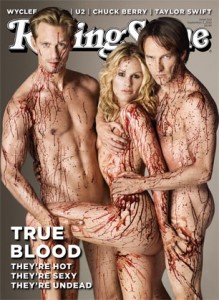 A while back I suggested that the development in vampires in film toward a darker expression of the iconic creatures in films like 30 Days of Night may represent a reaction against the popularity of the zombie, and an attempt at reasserting the dominance of the vampire. Now we are seeing depictions of the vampire that also react against vampire concepts such as those in the Twilight films. This has been demonstrated in the recent conference in the UK where scholars raised concerns about the “Americanization” of the vampire, and also through those associated with HBO’s True Blood program. As the creator of the program says in relation to the appearance of some of the show’s cast members on the cover of Rolling Stone,
A while back I suggested that the development in vampires in film toward a darker expression of the iconic creatures in films like 30 Days of Night may represent a reaction against the popularity of the zombie, and an attempt at reasserting the dominance of the vampire. Now we are seeing depictions of the vampire that also react against vampire concepts such as those in the Twilight films. This has been demonstrated in the recent conference in the UK where scholars raised concerns about the “Americanization” of the vampire, and also through those associated with HBO’s True Blood program. As the creator of the program says in relation to the appearance of some of the show’s cast members on the cover of Rolling Stone,
The idea of celibate vampires is ridiculous, True Blood creator Alan Ball says. “To me, vampires are sex,” he says. “I don’t get a vampire story about abstinence. I’m 53. I don’t care about high school students. I find them irritating and uninformed.”
Vampires continue to develop and evolve and are presented in varying fashion to meet the needs of diverse pop culture consumers. Whether celibate or sexual, American or European, these monsters thankfully involve a malleability that appeals to our tastes in the undead.
Related posts:
“30 Days of Night and the Oppositional Reconstruction of Vampire Symbolism”
“HBO’s True Blood: Viral Marketing and Fact-Fiction Reversals”





2 Responses to “Vampire Evolution: Beyond Americanized and “Twilightized” Depictions”